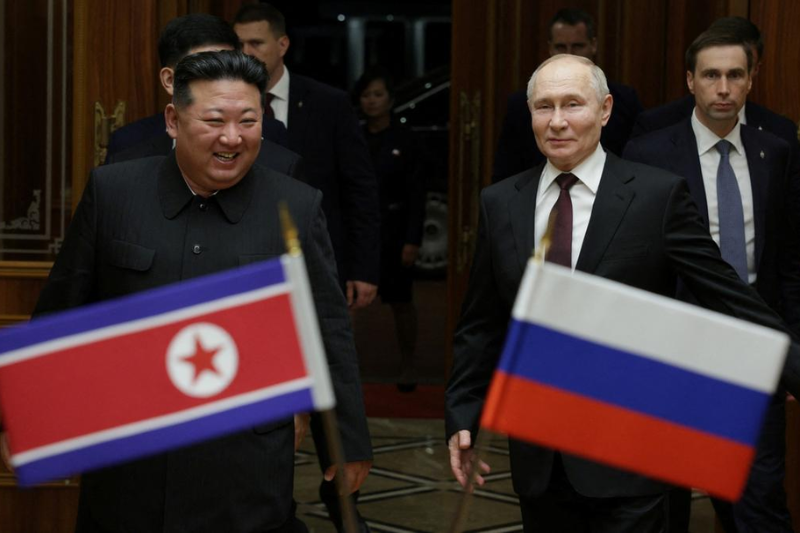
Putin’s Historic Visit to Pyongyang: A New Era of Russian- North Korean Relations
A Grand Welcome for Putin
Russian President Vladmir Putin received a grand and lavish welcome in Pyongyang during his first visit to North Korea in 24 years. North Korean leader Kim Jong Un greeted him at the airport with a warm hug and handshake, setting the tone for the visit. The two leaders then traveled in a grand motorcade through the brightly illuminated streets of Pyongyang, adorned with Putin’s portraits and Russian flags. Tens of thousands of spectators, which included children with balloons and citizens in coordinated attire, lined the streets to cheer for the Russian president.
Putin and Kim Sign Historic Partnership Pact
During the highly anticipated visit, Putin and Kim signed a new partnership agreement that promises mutual aid if either country is attacked. This pact is considered the strongest bond between Pyongyang and Moscow since the collapse of the Soviet Union in 1991. Both leaders emphasized the significance of this major upgrade of their ties. Kim called it the “strongest ever treaty,” while Putin hailed it as a “breakthrough document” that reflects their shared desire to elevate their relationship to a higher level.
This new strategic partnership replaces previous agreements signed in 1961, 2000 and 2001, according to the Russian state news agency TASS. The details of the pact were not immediately revealed, but it embraces various areas, including military technical cooperation, medical education, healthcare and science.
Historical Agreements Between Russia and North Korea
The 1961 Treaty of Friendship, Cooperation and Mutual Assistance
This Cold War- era agreement established strong military and economic ties, including mutual defense obligations, ensuring each nation would support the other if attacked.
This declaration revitalized bilateral relations after the Soviet Union’s collapse. It focused on upgrading economic, diplomatic and cultural ties, focusing on mutual respect and peaceful cooperation and resolving Korean Peninsula issues through dialogue.
The 2001 Treaty of Friendship, Good Neighborliness and Cooperation
Signed by President Putin and Kim Jong II, this treaty promoted comprehensive cooperation in economic, political and cultural fields and reaffirmed mutual defense commitments, aiming to nurture regional stability and security
Impact on Regional Politics and the America
The strengthening ties between North Korea and Russia come at a time when both nations face escalating tensions in the West. The partnership could evidently impact regional politics and the dynamics in American politics and policies.
Regional Implications
Military Cooperation: The agreement includes potential military technical cooperation, which could raise security concerns among neighboring countries and U.S. allies. North Korea’s support for Russia’s war in Ukraine, coupled with Russia’s potential transfer of technology and economic aid, could encourage Kim’s nuclear weapons and missile program.
Geopolitical Shifts: The alliance between Moscow and Pyongyang might contribute to the shift of regional power dynamics, particularly affecting South Korea, Japan and China. Increased military collaboration and economic ties could lead to a more assertive North Korean stance in regional disputes.
Impact on America
Strategic Challenges: For the United States and its allies, the strengthening Russia- North Korea partnership represents a strategic challenge. It underscores Russia’s efforts to forge alliances that can support its objectives in Ukraine and countern Western politics.
Economic Sanctions: Both North Korea and Russia are heavily sanctioned by U.N. and Western nations. This new partnership might prompt additional sanctions or measures targeted at curbing their collaborative efforts, particularly if evidence of military aid exchanges surfaces.
Putin’s North Korea visit marks a remarkable development in international relations, signaling a new era of cooperation between Pyongyang and Moscow. As both the nations find their respective standoffs with the West, this alliance could reshape the geopolitical scene in East Asia and beyond. The world will be closely watching how this partnership evolves and its implications for global security and diplomacy.
https://twitter.com/tassagency_en/status/1803396915779747982?t=jQy_nNCbL3zuVTtWZ9HNSw&s=08



